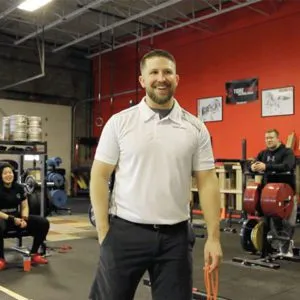Why do you exercise? If you don’t, why don’t you? If you would like to, what are the reasons for wanting to start? Everyone has goals, and reasons why they train. Some of us want to jump higher for a sport, some of us want to look good at a wedding or be more attractive to a partner. Maybe you want to run a 5k. There are lots of reasons why you would want to start training, and likely you probably have an opinion or idea about how those goals will be accomplished. Exercise seems to be one of the few topics that everyone thinks they know about. Take a moment the next time you’re in a restaurant, or at the car dealership waiting for your car to be serviced, or at the park walking your dog. Listen to the conversations around you and you’ll likely hear someone talking about fitness or nutrition. “Have you seen Martha lately? She’s lost a ton of weight with Nutrisystem,” the woman at the table next to you remarks, or maybe the waitress comments about how she hasn’t tried the dish you’re ordering because she’s on a diet. The people at the park talking about all the running they’ve been doing in an attempt to lose weight, or the auto mechanic chatting up a co-worker about how to get bigger arms at the gym.
What I’ve come to learn is that most people’s understanding of fitness, is about the same as their understanding of how the law and trial works. Which is to say, they may be aware of the general proceedings, but when it comes to it’s intricacies, they have at best, a guess. This leads to many people being surprised by their training programs when they first start. The client comes in with a goal of weight loss, and instead of being prescribed hours of cardio, they have some basic strength training programmed with a few tabatas sprinkled in. A client wants to compete in Powerlifting, where the goal is to lift the most weight for a single rep, and they are told to do sets of 15 with 50% of their max weight. A client says they have a goal of more defined arms, and they find themselves doing lots of squats. You get the point.
The truth is, we have a hidden agenda. While you’re sitting down with us, going over your health history, exercise experience, and telling us all about your goals, we are listening intently, and a lot of times planning in the back of our minds how easy or difficult of a transition it will be for you to go from what you expected, to what we’re actually going to have you do in your training. While you might be envisioning yourself being a badass triathlete, toughing out brutal conditioning workouts, or dreaming of fitting into a smaller dress via crushing sweat sessions in the gym, we’re tallying up how weak your core is, we’re making notes on how crooked you stand, we’re conjuring up ideas on how to fix your terrible shoulder mobility, all of which will need to be addressed through some solid fundamental training before you can really get to the fun stuff. If you’re a distance runner we’re going to focus on training your posterior chain which is often underdeveloped in people who run. If you’re a baseball player we’re going to train rotation in the opposite direction from how you bat or throw, because if you don’t asymmetries will be created. If your goal is weight loss, we will focus on getting you strong, so you can work harder in the gym, and thus burn more calories.
We’ve talked about this concept before, in our article about building the ability to work hard, but it’s an important enough topic that we can shine light on it again. Maybe you want more toned arms, but only someone that doesn’t care about your health would have you ignore training your legs as well. Maybe you only care about having visible abs, but that doesn’t mean that becoming stronger isn’t a good idea, and little do you know, a lot of your goals, and our goals for you go hand in hand. A lot of times clients will say something to the effect of “I want to do 3 days of cardio and 2 days of lifting.” But that’s not how fitness works. If you want to do cardio for the sake of doing it, you don’t need to pay us any money. Go do it. You tell us the goal, and we tell you the best way to get there. You may not understand what heavy tempo squats have to do with running an obstacle course race until you easily absorb the impact of running down a mountain. You may not understand what doing pull-ups has to do with weight loss until you don’t just see the inches drop off of your waist, but your arms become more defined as well. You may not understand why you’re doing bench presses when your goal is to clean & jerk more until you realize that with more shoulder stability it’s easier to lock the bar overhead.
It begs the question, why don’t we just tell people this? The simple answer: They don’t believe us. In fact there are people that don’t even walk through our doors in the first place because they think they know what we do, and they think that what we do is not what they need to do. That’s okay. Honestly we don’t really want to train those people anyway. We want to train people who want to be in our facility and our committed to making change, but also respect our experience, and our proven results. The people that think they know…well if they are experts, why haven’t their methods brought them to where they want to be? People always have a reason to not believing us. I’m well aware that I myself do not look like your typical “personal trainer” (although I certainly used to), but that’s only one of the many excuses people will use before even trying our services. If I was I was ripped the excuse would be “oh he’s always been like that, he has no idea what it’s like to be overweight,” or something to that effect. Because I’m a man, it’s always I don’t understand a woman’s metabolism, if I was a woman the reason would be the opposite, I would have no idea how to train men. But an oncologist doesn’t have to have cancer to be able to learn about how to treat it, and then effectively implement those methods. In an analogy closer to the actual topic, take coaches like Tudor Bompa, Dr. Michael Yessis, or world renowned strength coach Charles Poliquin. All three of them have produced champions (sometimes of the world or Olympic levels) in sports ranging from wrestling, to rowing, to track, to volleyball and so on, but ask any one of them, and they were never champions in those sports themselves, many of them have never played those sports professionally or even recreationally.




